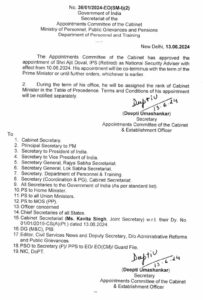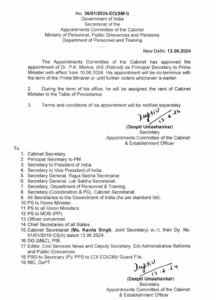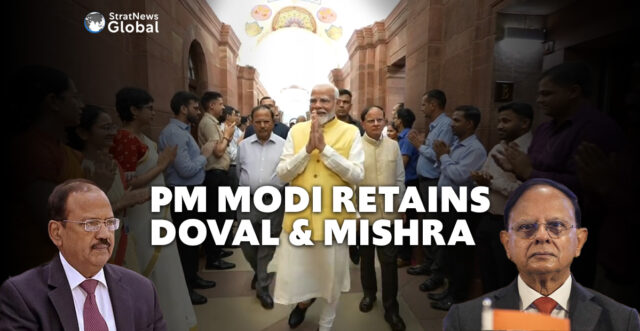On Monday, 10 June, Prime Minister Narendra Modi entered his South Block Office for the first time after taking oath for the third consecutive term as the country’s Chief Executive. The video footage of the Prime Minister being greeted by the staff in the corridors of South Block where the PMO is located, officially shared by state media, had a sub-text which did not escape attention of those who watch government affairs closely.
Seen in the video were two men walking two steps behind the Prime Minister. Ajit Doval, India’s National Security Adviser (NSA) for a decade since 2014 and PK Mishra, Modi’s Principal Secretary since 2019, have been the Prime Minister’s closest advisers, each with crucial and distinct roles in the Modi PMO.
Subsequent visuals of the first meeting of the new Cabinet which took office on 9th June and a couple of other crucial meetings chaired by the Prime Minister also showed both Doval and Mishra in attendance. It was clear to discerning observers that both loyalists were going nowhere contrary to some uninformed speculation on social media and gossip in Delhi’s cocktail circuits, primarily because their formal appointments were not announced even two days after the Prime Minister had formally assumed office.
On Thursday, the Appointments Committee of the Cabinet (ACC) issued two separate notifications, reappointing both Doval and Mishra to their respective posts with the same terms as in the previous tenures. Both The NSA and the Principal Secretary have been given the status of a Cabinet Minister in the government Table of Precedence once again. More significantly, both appointments, like in the previous term, are co-terminus with the term of the Prime Minister or ‘until further orders.’
In a way, the two appointments are in keeping with the trend in the composition of the Modi 3.0 Cabinet. Apart from the Prime Minister, all the members of the Cabinet Committee on Security (CCS)—Defence Minister Rajnath Singh, Home Minister Amit Shah, External Affairs Minister S. Jaishankar and Finance Minister Nirmala Sitharaman—have retained the portfolios they had held in the previous cabinet. Other senior leaders such as Nitin Gadkari, Piyush Goyal, Hardeep Puri, Ashwini Vaishnav too have continued to head the same ministries as before.
This, despite the fact that Modi’s third term in office is sure to be much different than the previous decade. He is now at the head of a coalition government and unseen, unexpected challenges in day-to-day governance are bound to crop up in the new avatar of the National Democratic Alliance (NDA) government. That is where Doval and Mishra will bring their decades-long experience to the table. Both have their roles cut out. Mishra runs the PMO and is the last word on appointments to crucial posts; Doval is Modi’s go-to man in crisis situations and in handling critical strategic relationships such as the ones with Russia and US, besides being the point man for all national security matters.
There have been some voices, albeit muted, in strategic circles pointing out that both Mishra and Doval are in their seventies—Doval is 79 and Mishra is 75. However, according to those who interact with them regularly, both remain sharp and on top of their respective jobs.
Doval, already India’s longest serving NSA by a distance, has played a major role in expanding the National Security Council Secretariat (NSCS) and played a pivotal role in initiating and implementing major national security reforms such as creating the post of the Chief of Defence Staff (CDS), establishing the Department of Military Affairs (DMA) in the Ministry of Defence (MoD) as a stepping stone towards the eventual creation of joint or theatre commands in the Indian military and implementing the corporatisation of the Ordnance Factory Board (OFB). A comprehensive National Security Strategy document is also a work in progress under his stewardship and is likely to be finalised in this term of the NDA government, from all available indications.
The formal announcement confirming the reappointment of Modi’s closest and senior most bureaucratic aides hours before he left for Italy to participate in the G-7 Summit on Thursday evening is perhaps the final confirmation that majority or no majority, the Prime Minister continues to repose his complete trust in these two stalwarts.

Nitin A. Gokhale is a media entrepreneur, one of South Asia's leading strategic affairs analyst and author of over a dozen books so far on military history, insurgencies and wars.
Starting his career in journalism in 1983, he has since led teams of journalists across media platforms.
A specialist in conflict coverage, Gokhale has covered the insurgencies in India’s North-East, the 1999 Kargil conflict and Sri Lanka’s Eelam War IV between 2006-2009.
Gokhale now travels across the globe to speak at seminars and conferences, and lecture at India’s premier defence colleges. He has founded three niche portals, Bharatshakti.in, stratnewsglobal.com and Interstellar.news.





